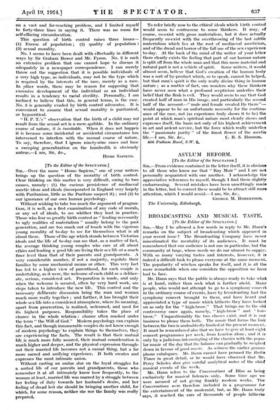[To the Editor of the SPECTATOR.]
'SIR,—Over the name " Homo Sapiens," one of your writers brings up the question of the morality of birth control.
Clear thinking on this matter is very difficult, owing to two causes, namely : (1) the curious persistence of mediaeval ascetic ideas and ideals (incorporated in England very largely with Puritanism, little as the Puritans suspect it) ; and (2) to our ignorance of our own human psychology.
Without wishing to take too much the argument of pragma- tism, it is well, as a first examination of any code of morals, or any set of ideals, to see whither they lead in practice.
Those who fear so greatly birth control as " leading necessarily to ugly realities of materialism " usually belong to the past generation, and are -too much out of touch with the vigorous young morality of to-day to see for themselves what is all about them. Those of the age which stands between Victorian ideals and the life of to-day can see that, as a matter of fact, the average thinking young couples who care at all about ethics and leading a good life are living their sex life at a much finer level than that of their parents and grandparents. A very considerable number, if not a majority, regulate their families by some mechanical means or other. This very fact has led to a higher view of parenthood, for each couple is undertaking, as it were, the welcome of each child as a deliber- ate, . serious, considered act. Preparation is made, and only when the welcome is secured, often by very hard work, are steps taken to introduce the new life. This control and the necessary deliberate discussion bring the man and woman much more really together ; and further, it has brought their whole sex life into a considered atmosphere, where its meaning, apart from procreation, is realized, welcomed, and used for its . highest purposes. Responsibility takes the place of chance in the whole relation : chance often masked under the term " the Will-of God." Modern psychology can explain this fact, and though innumerable couples do not know enough
of, modern psychology-to explain things to therhselves, they are experiencing the facts. The result is that their mutual
life is much more fully assured, their mutual consideration is much higher and deeper, and the physical expression through- out their married life becomes not a casual thing, but a far more sacred and unifying 'thiperience. It both creates and expresses the most intimate union.
Without casting an undue slur on the loyal struggles for a united life of our parents and grandparents, those who remember it itt, all intimately know how frequently, to the woman at least, married life was marred by a struggle between her feeling of duty towards her husband's desire, and her feeling of dread lest she should be bringing another child, for which, for some reason, neither she nor the family was really. prepared.
To refer briefly now to the ethical ideals which birth control would seem to contravene to some thinkers. It may, of -course, co-exist with gross materialism, but it does actually frequently co-exist with the overthrowing of the last subtle materialism which lies at the root of mediaeval asceticism, and of the dread and horror of the full use of the sex experience to-day. At the back of the mind of the writer of your letter there clearly exists the feeling that part of our human nature is split off from the whole man and that this more material and natural part is not a vehicle of spirit. Some writers, it would alMost seem, believe that God's creation of the human body was a sort of by-product which, so to speak, cannot be helped, but that man's spirit is the only really divine thing in human nature ; as a matter of fact, one wonders why these thinkers have never _seen what a profound scepticism underlies their belief that the flesh is evil. They would seem to say that God created half of man in His image, and particularly the second half of the account—" male and female created Ile them"— would appear to be an unfortunate necessity for the continu- ance of the race, not (as experience truly shows it to be) the point at which man's spiritual nature most clearly shows and expresses itself, the basis not only of his highest achievement in art and ardent service, but the force which really underlies the " passionate purity " of the finest flower of the ascetic


































 Previous page
Previous page